Crip News v.104
Trying something: plainer language for solidarity with Palestine. Thanks for being here.
today’s issue focuses on the catastrophes facing the captive population of Palestine (with the exception of the event listings at the end). and we’re trying something new: translating disability theory (from Jasbir Puar’s The Right to Maim) into plainer language. i hope the information below can help us better understand what we are witnessing so that we can feel readier, together, to demand an end to the Israeli government’s genocidal actions.
-kevin
NEWS
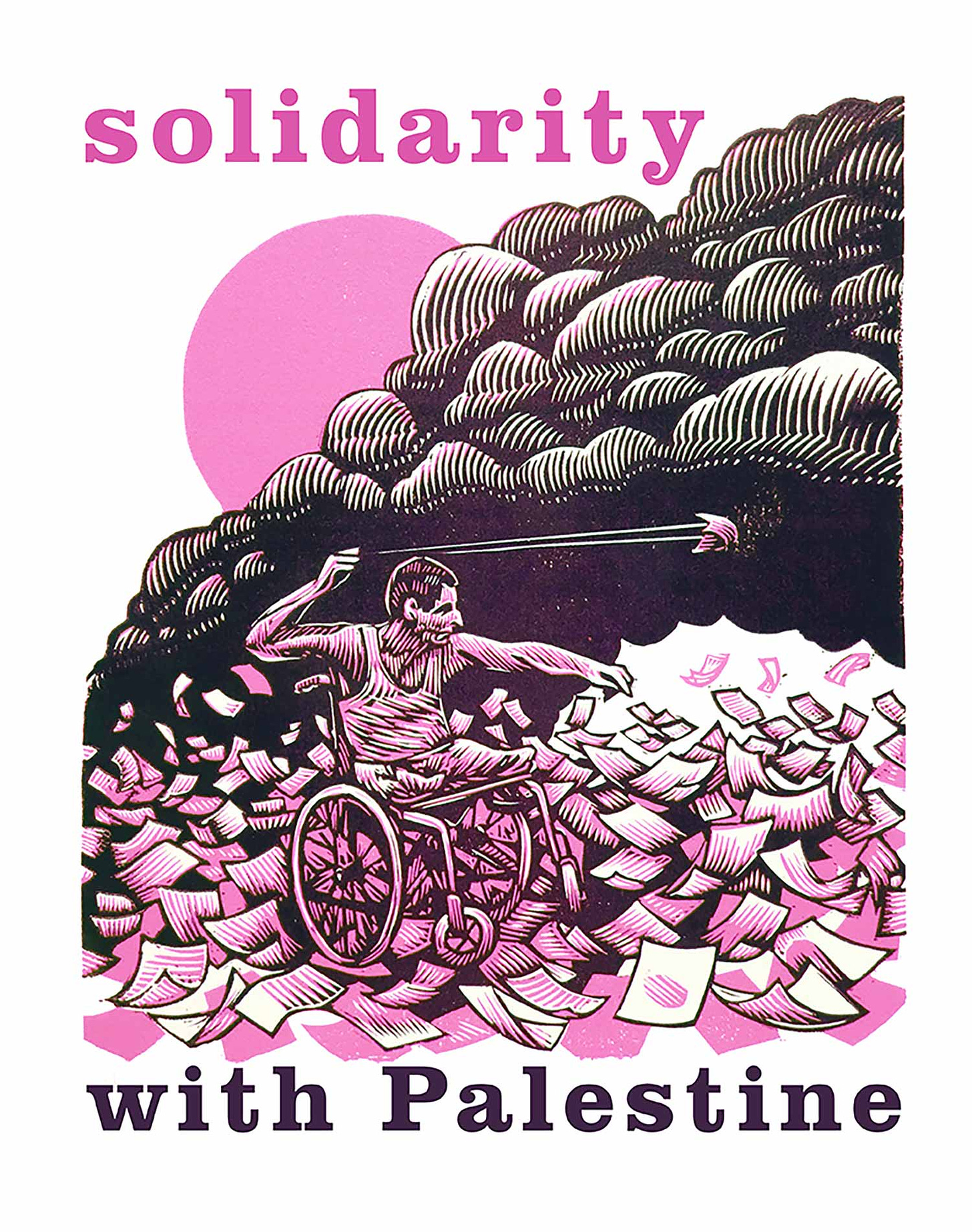
Artists and cultural leaders around the globe have issued powerful calls for solidarity with the Palestinian people, demanding an immediate ceasefire and for the opening of Gaza’s crossings to allow adequate humanitarian aid to enter. Open letters from artists in the US, the UK, and Canada have circulated widely and generated thousands of signatures.
Disabled artists and organizers quickly recognized that the horrors facing Palestinians right now are part of a long tradition of Israeli violence that wields disease and deprivation as weapons of illegal war, making disability a key part of the conflict and its context.
Many have cited a 2021 statement from the the Abolition and Disability Justice Collective that lays out how settler colonization is a Disability Justice issue, naming specific global connections through funding and shared tactics of terror that bolster Israel’s violence.
Imani Barbarin, a popular disabled activist on social media, has been collecting and making hard-copy transcriptions of video testimony from Palestinians because, she says, she “knows exactly what it’s like to have your stories in the hands of somebody else.”
Many have called for direct support for those on the ground, like The Atfaluna Society, an organization that has been supporting Deaf Palestinians in Gaza for 30 years, is calling for wire transfer donations for food, hygiene kits, and other essentials. MORE INFO HERE.
In San Diego, a Deaf Palestinian refugee worked as an ASL interpreter for a recent vigil. You can donate to their compensation here.
For those interested in the field of disability arts in Occupied Palestinian Territories, check out this March 2021 report from Disability Under Siege, a multidisciplinary project seeking to transform education and culture around disability in Palestine, that examined “the opportunities and barriers to promoting discussion of culture, disability, and inclusive education” in the region.
Puar in Plainer* Language
Jasbir Puar’s 2017 book The Right to Maim: Debility, Capacity, Disability made some major contributions to the study of disability by looking at the ways Israel designates Palestinians as available for injury.
But what does that really mean, “designating” people as “available for injury”? This is a tough text. Its breakthroughs are in language that is difficult to understand. So, with the help of an amazing crew that assembled - Alison Kopit, Aimi Hamraie, Kelsie Acton - today we offer some translations from the book into simpler language.
*It’s important that we call this plainer language. The movement for Plain Language is being led by some amazing organizers that stress the necessity of feedback from people who use materials in this format, particularly through focus groups with people with intellectual and developmental disabilities. We didn’t do that here (and are keeping the provocation close for more direct engagement readers who use plain language in the future) but we’re giving this a try so that more people in disability communities can access these important concepts. For more about Plain Language, check out these resources as a start.
Translations of key concepts:
Disability rights says that disabled people should be included in society and treated as equal. Disability rights uses laws to protect disabled people. This encourages people to be proud of their identity as disabled.
But disability rights does not protect all disabled people. Sometimes people do not want others to call them disabled. Some people may not want to participate in disability activism. There are a lot of people who could be defined as “disabled” that are being left out.
When we think about disability, we often focus on the moment an individual becomes disabled. For example, if someone becomes disabled after an accident, we focus on that event. But what happens when getting hurt happens slowly to a group of people because of how that group is treated? We need a way to understand the larger contexts around disability.
For example, the Israeli government has caused serious harm to Palestinian people. When the Israeli military takes away food, water, and electricity, it hurts Palestinian people over time. This is called “slow violence.” Sometimes this violence is ignored because Israel defends its right to hurt Palestinians. Sometimes Israel says it treats queer and disabled people with great respect as a way to distract from the harm they are causing to Palestinians.
There’s a word that can help us understand the process of hurting people slowly: debility. Debility explains how people get hurt every day. Debility says that having a body that is hurt or works differently from others is very common. We can miss how it is common it is when we only think of Disability Rights. People need accessibility and accessibility means freedom from slow violence. This is very different from how we usually think about accessibility.
Debility can include 3 things: getting hurt because of work, what kind of care someone gets, and how someone’s race affects their ability to work or receive care. Depending on these things, someone might have capacities apart from how they may identify with disability. It all depends on how someone is affected by work, care, and race.
When we talk about debility, we include people who do not identify as disabled but are hurt or excluded in some way. Debility helps us understand that it’s not so easy to separate ability and disability.
Disability and debility are both important concepts. They work together. We can use Disability Rights for people who identify as disabled. But we also need to think about what people experiencing debility need. If we do this, we can expand and strengthen our work.
EVENTS
We Been Here! A Digital Event Celebrating Hip Hop Artists with Disabilities
Saturday, Oct. 28, 6:30 - 9:30pm ET, on Zoom
In keeping with the mission of the Soul Touchin’ Experiences LLC and in partnership with Catalyst Consulting Associates, Calling Up Justice, Alikah Enterprises, Diversability and RAMPD, join us in exploring how disability has played a part in the inception and evolution of hip hop. On October 28 we highlight Emmy Award Winners Keith Jones and Toni Hickman, with guests Wheelchair Sports Camp and more! This event will get you a chance to experience the art form in ways you may never have before. In a time where diversity equity and inclusion are in the forefront as well as, the push for social justice, disability is still a parent of the conversation not. Each week touches on the history and influence of the art form and how it is or is not inclusive of the disability community.
Julia Pastrana’s Long Journey Home
Wednesday, Oct. 25, 18.00 CET, on Zoom
Julia Pastrana (1834–1860) was a talented Indigenous Mexican opera singer who performed across the US and Europe. She was born with hypertrichosis terminalis and hyperplasia gingival: long, dark hair covered her body. Expressions like ‘Ape Woman’ were used to incite audiences to her performances; after her death, she was embalmed and exhibited for another hundred years before disappearing from public view. From 2003 to 2013, Laura Anderson Barbata pursued the arduous task of bringing Pastrana home to Sinaloa for a dignified burial. In performances, zines, videos and a book, Anderson Barbata sheds light on how the systems that justified Julia Pastrana’s exploitation still operate today.
Firewood Collective’s Halloween Party
Friday, Oct. 27, 7 - 9pm ET, on Zoom
Do you need some time to just hang out with people, without having to talk, think, learn, or be on camera if you don't want to? We sure do! From your floor, your chair, or your table join DJ Chico Chi and Go-Go dancers Blue Charisma and Cinnamon Maxxine for a tea dance party. Come dressed in your best costume or your coziest pajamas. We can't wait to party with you!
The Rocky Horror Picture Show in ASL
Saturday, Oct. 28, 8:15pm ET, in-person at Buddies in Bad Times Theatre (Toronto)
Let's do the time warp again! For the first time ever in Toronto, don’t miss a screening of cult classic The Rocky Horror Picture Show featuring ASL interpretation by a Deaf cast! Presented in partnership with the Toronto Fringe as part of the 2023 Next Stage Theatre Festival, join The Disability Collective to sing, dance, and sign along to kick off your Halloweekend!
And Yet Festival
Oct. 28 & 29, in-person at Arts On Site (NYC)
"And Yet" - a festival curated by choreographer Heidi Latsky - is a beautiful and thought-provoking celebration of disability and dance. The four choreographers - Mark Travis Rivera, Nicole Marquez, and Leslie Taub - have very distinctive voices and bring a raw vulnerability and fierceness to the stage. All together, “And yet” will be a powerful and moving experience.
STIMulation: Somatic Transformation(s) through Improvisational Motions (of movement and sound), led by Dina Percia
Wednesday, Oct. 25, 2 - 4pm ET, on Zoom
This workshop aims to explore, reframe, and reclaim stimming—organic expressions and patterns of movement and sound—as an embodied and liberatory bodymind process. We will explore the idea and process of stimming (self-stimulation) as an intentional somatic praxis, as an entrypoint into movement and sound composition, and a gateway into authentic choreography in service of processing, regulation, creativity, and integration for all bodyminds.
Careers in the Arts for People with Disabilities
Wednesday, Oct. 25, 2:30 - 3:30pm ET on Zoom
Join us for an hour-long panel discussion with some of the top professionals in the fields of visual arts, performing arts, and arts administration! John Bramblitt, Monique Holt, and Beth Ziebarth will talk about their career paths, offer advice, and answer questions.
Rethinking Design through Disabled Perspectives
Tuesday, Oct. 24, 12pm ET, on Zoom
HMA2 Architects and The Jewelry Library are excited to host an online presentation with multi-sensory artist, designer, and educator Sugandha Gupta in celebration of World Sight Day/World Blindness Awareness Month. Borrowing from her own experience as a person with low vision, Gupta will discuss how disabled perspectives lend inclusive and generative approaches to design. We will explore best practices for creating accessible spaces, products, and services, gaining a new understanding of access and design that serves broader audiences in multiple ways.
Vibrant Verbal Description Tours: French Art Deco
Thursday, Oct. 26, 6 - 8pm ET (in-person, NYC) & Tuesday, Oct. 31, 4 -5pm ET (online)
Members of the low-vision and blind community are invited to an exciting, in-person Vibrant Verbal Description Tour at Poster House. These events will provide exclusive access to the museum’s exhibition, Art Deco: Commercializing the Avant-Garde.


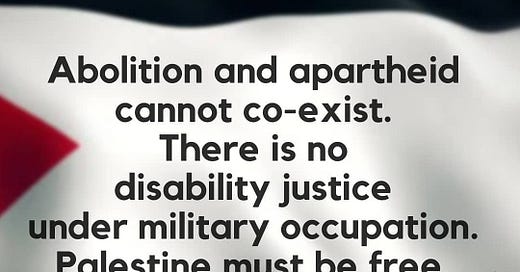



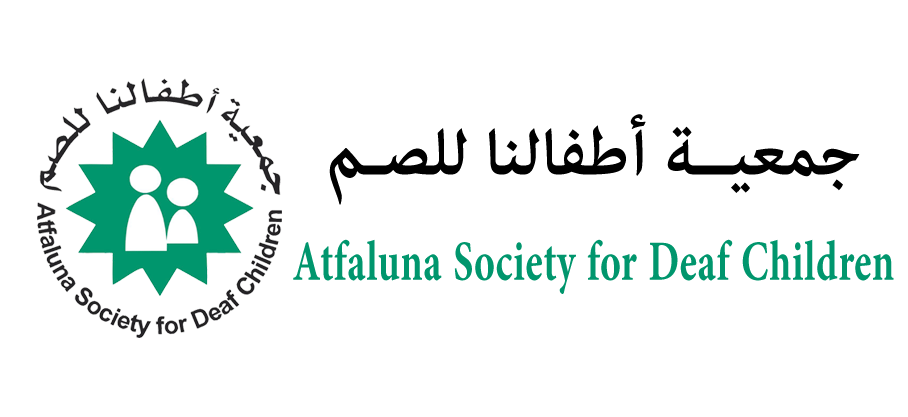
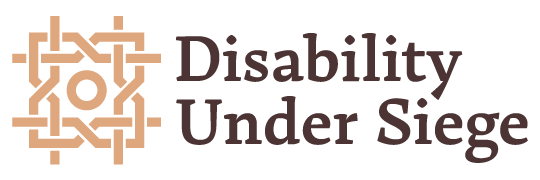
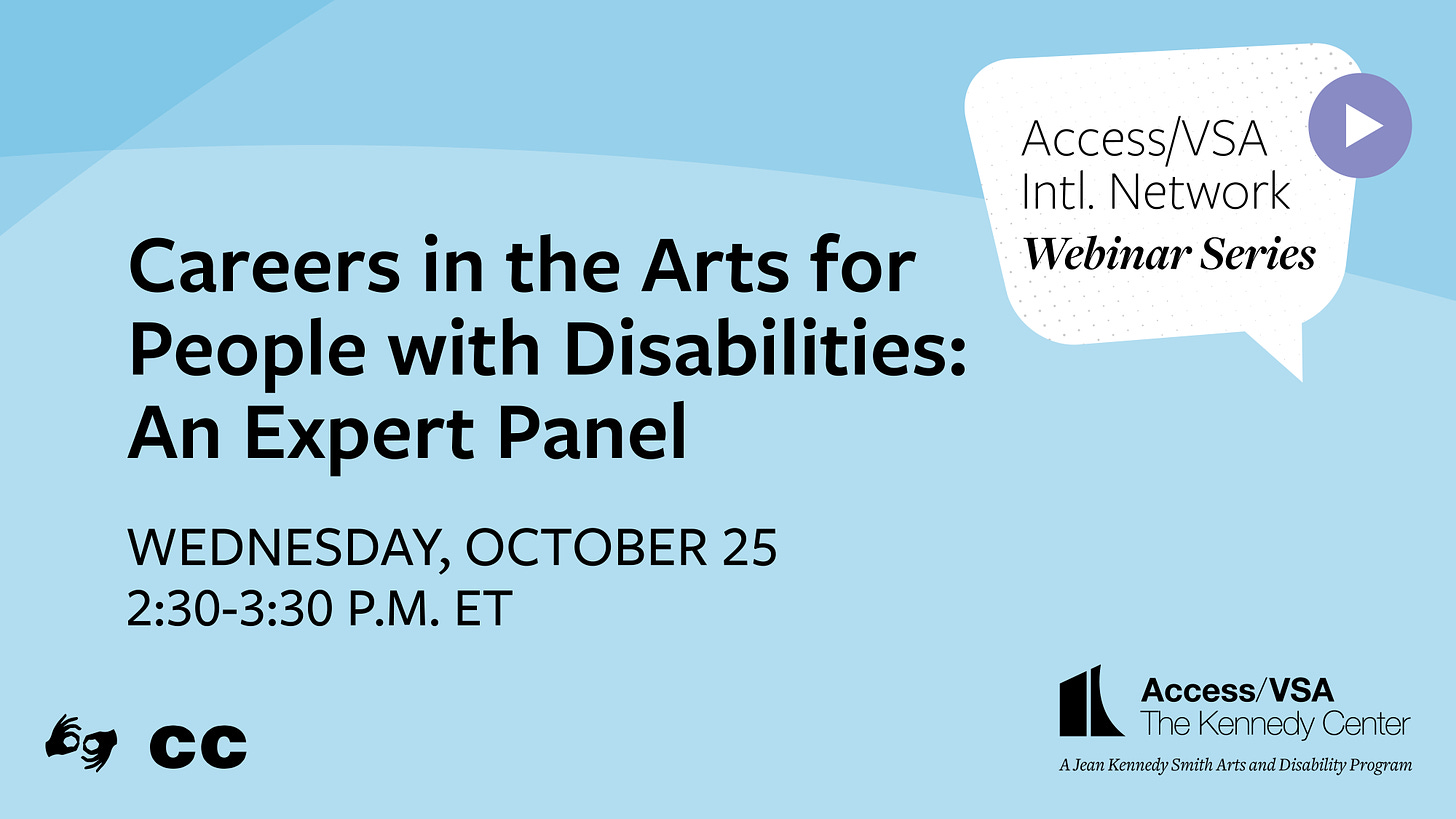
Dear Kevin,
Thank you so much for this mornings Crip News.
Honestly, I wasn't going to read this morning, trying to take a break after a big event yesterday...but I thought about this spoken word musical I am the accessibility director of and how I am creating a training for the designers/tec so we can develop a shared understanding of what it means to create a show that centers on disability and accessibility and I read.
And I am so glad I did. This mornings Crip News met me just where I am. The plan text REALLY worked for me. I have been keenly aware of the disabling effects of war. It is the first and maybe the most impactful thing I learned in my first disability class 30 years ago. It is what I have wanted to talk about around the Palestinian and Israel war, but being a mixed heritage, not so practicing Jew, I had yet to find the words to frame what I knew was so important here...people and their bodies and the slow and fast effects of the last two weeks and the last 50 years has taken on these people. Thank you for giving me a frame work to start to speak out.
But I also think what you wrote put words to some other things I have been struggling with...I think it will be very helpful in my work as accessibility director for this play I am working on and its why I say with The Body is Good Project that it is for any one with a body.
Thank you for trying out this new format. I LOVED it and hope you do more of it. I also loved the long list of events at the bottom and plan to use some of my "take a break" time to sign up.
Yours in art, accessibility, and dear I say revolution.
Jessica
Jessica Wallach (she/her/hers)
Thanks for this important issue of your newsletter. Unfortunately, you have declared a side in the conflict between Israelis and Palestinians.
Death, injury and disability-making are affecting everyone engaged in this war, whether they are Israeli, Palestinian or other human beings caught up in the conflict. I think it's important to advocate for peace in the region, period, without choosing sides.